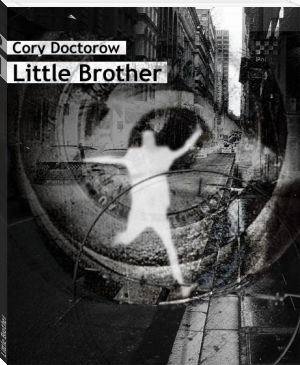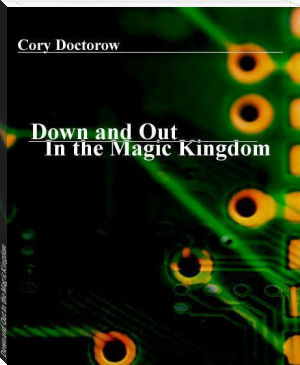Little Brother - Cory Doctorow (book recommendations website txt) 📗

- Author: Cory Doctorow
Book online «Little Brother - Cory Doctorow (book recommendations website txt) 📗». Author Cory Doctorow
have invented a way of descrambling the messages." I had visions of a hollow mountain full of National Security Agency mathematicians reading every email in the world and snickering.
In fact, that's pretty much what happened during World War II. That's the reason that life isn't more like Castle Wolfenstein, where I've spent many days hunting Nazis.
The thing is, ciphers are hard to keep secret. There's a lot of math that goes into one, and if they're widely used, then everyone who uses them has to keep them a secret too, and if someone changes sides, you have to find a new cipher.
The Nazi cipher was called Enigma, and they used a little mechanical computer called an Enigma Machine to scramble and unscramble the messages they got. Every sub and boat and station needed one of these, so it was inevitable that eventually the Allies would get their hands on one.
When they did, they cracked it. That work was led by my personal all-time hero, a guy named Alan Turing, who pretty much invented computers as we know them today. Unfortunately for him, he was gay, so after the war ended, the stupid British government forced him to get shot up with hormones to "cure" his homosexuality and he killed himself. Darryl gave me a biography of Turing for my 14th birthday -- wrapped in twenty layers of paper and in a recycled Batmobile toy, he was like that with presents -- and I've been a Turing junkie ever since.
Now the Allies had the Enigma Machine, and they could intercept lots of Nazi radio-messages, which shouldn't have been that big a deal, since every captain had his own secret key. Since the Allies didn't have the keys, having the machine shouldn't have helped.
Here's where secrecy hurts crypto. The Enigma cipher was flawed. Once Turing looked hard at it, he figured out that the Nazi cryptographers had made a mathematical mistake. By getting his hands on an Enigma Machine, Turing could figure out how to crack any
Nazi message, no matter what key it used.
That cost the Nazis the war. I mean, don't get me wrong. That's good news. Take it from a Castle Wolfenstein veteran. You wouldn't want the Nazis running the country.
After the war, cryptographers spent a lot of time thinking about this. The problem had been that Turing was smarter than the guy who thought up Enigma. Any time you had a cipher, you were vulnerable to someone smarter than you coming up with a way of breaking it.
And the more they thought about it, the more they realized that anyone
can come up with a security system that he can't figure out how to break. But no one
can figure out what a smarter person might do.
You have to publish a cipher to know that it works. You have to tell as many people as possible
how it works, so that they can thwack on it with everything they have, testing its security. The longer you go without anyone finding a flaw, the more secure you are.
Which is how it stands today. If you want to be safe, you don't use crypto that some genius thought of last week. You use the stuff that people have been using for as long as possible without anyone figuring out how to break them. Whether you're a bank, a terrorist, a government or a teenager, you use the same ciphers.
If you tried to use your own cipher, there'd be the chance that someone out there had found a flaw you missed and was doing a Turing on your butt, deciphering all your "secret" messages and chuckling at your dumb gossip, financial transactions and military secrets.
So I knew that crypto would keep me safe from eavesdroppers, but I wasn't ready to deal with histograms.
I got off the BART and waved my card over the turnstile as I headed up to the 24th Street station. As usual, there were lots of weirdos hanging out in the station, drunks and Jesus freaks and intense Mexican men staring at the ground and a few gang kids. I looked straight past them as I hit the stairs and jogged up to the surface. My bag was empty now, no longer bulging with the ParanoidXbox discs I'd been distributing, and it made my shoulders feel light and put a spring in my step as I came up the street. The preachers were at work still, exhorting in Spanish and English about Jesus and so on.
The counterfeit sunglass sellers were gone, but they'd been replaced by guys selling robot dogs that barked the national anthem and would lift their legs if you showed them a picture of Osama bin Laden. There was probably some cool stuff going on in their little brains and I made a mental note to pick a couple of them up and take them apart later. Face-recognition was pretty new in toys, having only recently made the leap from the military to casinos trying to find cheats, to law enforcement.
I started down 24th Street toward Potrero Hill and home, rolling my shoulders and smelling the burrito smells wafting out of the restaurants and thinking about dinner.
I don't know why I happened to glance back over my shoulder, but I did. Maybe it was a little bit of subconscious sixth-sense stuff. I knew I was being followed.
They were two beefy white guys with little mustaches that made me think of either cops or the gay bikers who rode up and down the Castro, but gay guys usually had better haircuts. They had on windbreakers the color of old cement and blue-jeans, with their waistbands concealed. I thought of all the things a cop might wear on his waistband, of the utility-belt that DHS guy in the truck had worn. Both guys were wearing Bluetooth headsets.
I kept walking, my heart thumping in my chest. I'd been expecting this since I started. I'd been expecting the DHS to figure out what I was doing. I took every precaution, but Severe-Haircut woman had told me that she'd be watching me. She'd told me I was a marked man. I realized that I'd been waiting to get picked up and taken back to jail. Why not? Why should Darryl be in jail and not me? What did I have going for me? I hadn't even had the guts to tell my parents -- or his -- what had really happened to us.
I quickened my steps and took a mental inventory. I didn't have anything incriminating in my bag. Not too incriminating, anyway. My SchoolBook was running the crack that let me IM and stuff, but half the people in school had that. I'd changed the way I encrypted the stuff on my phone -- now I did
have a fake partition that I could turn back into cleartext with one password, but all the good stuff was hidden, and needed another password to open up. That hidden section looked just like random junk -- when you encrypt data, it becomes indistinguishable from random noise -- and they'd never even know it was there.
There were no discs in my bag. My laptop was free of incriminating evidence. Of course, if they thought to look hard at my Xbox, it was game over. So to speak.
I stopped where I was standing. I'd done as good a job as I could of covering myself. It was time to face my fate. I stepped into the nearest burrito joint and ordered one with carnitas -- shredded pork -- and extra salsa. Might as well go down with a full stomach. I got a bucket of horchata, too, an ice-cold rice drink that's like watery, semi-sweet rice-pudding (better than it sounds).
I sat down to eat, and a profound calm fell over me. I was about to go to jail for my "crimes," or I wasn't. My freedom since they'd taken me in had been just a temporary holiday. My country was not my friend anymore: we were now on different sides and I'd known I could never win.
The two guys came into the restaurant as I was finishing the burrito and going up to order some churros -- deep-fried dough with cinnamon sugar -- for dessert. I guess they'd been waiting outside and got tired of my dawdling.
They stood behind me at the counter, boxing me in. I took my churro from the pretty granny and paid her, taking a couple of quick bites of the dough before I turned around. I wanted to eat at least a little of my dessert. It might be the last dessert I got for a long, long time.
Then I turned around. They were both so close I could see the zit on the cheek of the one on the left, the little booger up the nose of the other.
"'Scuse me," I said, trying to push past them. The one with the booger moved to block me.
"Sir," he said, "can you step over here with us?" He gestured toward the restaurant's door.
"Sorry, I'm eating," I said and moved again. This time he put his hand on my chest. He was breathing fast through his nose, making the booger wiggle. I think I was breathing hard too, but it was hard to tell over the hammering of my heart.
The other one flipped down a flap on the front of his windbreaker to reveal a SFPD insignia. "Police," he said. "Please come with us."
"Let me just get my stuff," I said.
"We'll take care of that," he said. The booger one stepped right up close to me, his foot on the inside of mine. You do that in some martial arts, too. It lets you feel if the other guy is shifting his weight, getting ready to move.
I wasn't going to run, though. I knew I couldn't outrun fate.
CHAPTER 7
This chapter is dedicated to New York City's Books of Wonder, the oldest and largest kids' bookstore in Manhattan. They're located just a few blocks away from Tor Books' offices in the Flatiron Building and every time I drop in to meet with the Tor people, I always sneak away to Books of Wonder to peruse their stock of new, used and rare kids' books. I'm a heavy collector of rare editions of Alice in Wonderland, and Books of Wonder never fails to excite me with some beautiful, limited-edition Alice. They have tons of events for kids and one of the most inviting atmospheres I've ever experienced at a bookstore.
[[Books of Wonder http://www.booksofwonder.com/ 18 West 18th St, New York, NY 10011 USA +1 212 989 3270]]
They took me outside and around the corner, to a waiting unmarked police car. It wasn't like anyone in that neighborhood would have had a hard time figuring out that it was a cop-car, though. Only police drive big Crown Victorias now that gas had hit seven bucks a gallon. What's more, only cops could double-park in the middle of Van Ness street without getting towed by the schools of predatory tow-operators that circled endlessly, ready to enforce San Francisco's incomprehensible parking regulations and collect a bounty for kidnapping your car.
Booger blew his nose. I was sitting in the back seat, and so was he. His partner was sitting in the front, typing with one finger on an ancient, ruggedized laptop that looked like Fred Flintstone had





Comments (0)